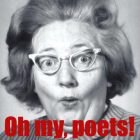Seven Chipmunks Twirling on a Branch: An Interview with Gillian Flynn
Gillian Flynn is the author of the New York Times #1 Best-Selling novel Gone Girl as well as Sharp Objects and Dark Places. Gillian is a fan of true crime books and a gold mine of popular culture data. She was over at my house for dinner one night with her husband, not too long ago. (He and my wife went to college together and a friend of theirs from those days was visiting.) The dinner was meant to be an opportunity to the three of them to catch up, and Gillian and I, left to our own devices, drank bourbon and started quoting from the remarkable hitchhiker scene in the 1998 movie There’s Something About Mary. We both knew the scene by heart. (I’ve tried to find it on youtube to no avail. Watch the movie if you don’t know what I’m talking about. The movie holds up and Harland Williams as the hitchhiker talking about his idea for “Seven Minute Abs” is a highlight.) Two months later, I brought a bottle of bourbon over to Gillian’s house and this interview happened.
[NB. There are spoilers in this interview, both for Gillian’s great book Gone Girl and of There’s Something About Mary. We also mention true crime masterpieces Joe McGinniss’s Fatal Vision and Truman Capote’s In Cold Blood. Nick and Amy are the main characters of Gone Girl.]
David MacLean: My first question is about the Harland Williams’ scene: “Seven Chipmunks sitting on a branch”
Gillian Flynn: “Eating lots of sunflowers from my uncle’s ranch. You remember that old children’s tale from the sea?”
DM: What I’m interested in hearing you talk about is why that scene is interesting.
GF: Why we’re both so obsessed with it?
DM: Exactly.
GF: It wouldn’t work without Ben Stiller there, in his straightest straight mannedness. What I like about it that his reaction is exactly what my reaction would be, which is like I’m going to be kind of polite to this person because I’m used to dealing with weird crazy people, because I think you and I are crazy person cat nip. I’m used to people saying weird things to me. So you nod along to “ Oh right, seven minute abs, okay. Like the eight minute abs.”
DM: You can see when you look back on the film that it’s a plot point. It’s an essential thing to have happen in order for the narrative but at what point does it take off and become something different?
GF: Have you ever heard if Harland Williams improvised it? It seems like it has to be improvised. Because it doesn’t seem like the Farrelly Brothers’ humor.
DM: Right, because their humor is “Man falls down” and not the associative madhouse of a crazy man.
GF: He picks all the right words. Like how people always say monkey is inherently funny. But here “Chipmunks” is great and chipmunks don’t twirl on a branch and you can picture it being picked up as a jumprope jingle. The world’s creepiest jumprope jingle.
DM: Creepy is a perfect contemporary word.
GF: Yeah. It’s very specific. It’s not ‘scary’. You’re just kind of giving me the willies, but I’m also ready to be amused, but you might kill me.
DM: It’s not actionable yet.
GF: Right.
DM: My related question is when you are writing, how do you recognize when you’re writing a plot point and the energy of it takes over and you have to give control over to it to let it do what it wants. When do you let the thing take over?
GF: In my first drafts, my characters wander around rooms a lot. They’re sort of like leftover video game program guys walking into walls. I like weird details, weird smells—there are lots of weird smells in my books. I like scenes where people are eating. I always think that’s inherently interesting, like what’s this person eating. In Sharp Objects the stepfather is always eating these bowls of milky eggs, trying to get that the milky string of egg into his mouth. I remember reading Thomas Harris’ Red Dragon and the agent walks into to interview this old man and he says that he could almost smell the old eggs stuck between the tines of his fork in the drawer. And it was like, “Wow, now we know everything we need to know about this guy.”
DM: Where some of this questioning comes from is that I’m really interested in the ottoman in Gone Girl. I’m interested in the ottoman as an object that recalls an object in Joe McGinniss’ Fatal Vision. The journey of that thing which started out as an homage—
GF: And then becomes its own thing in the book.
DM: Right.
GF: You start these things as little homages and then forget them right away. You forget where they started. It’s weird, you take the ottoman from Fatal Vison and you put it in your book, and it becomes a plot point in your book, but it becomes a different thing, a different time period. I can picture what the ottoman looks like and it’s brocaded differently, because I can picture Nick and Amy collecting antiques and everything. I just like the idea of him being challenged to turn over this stupid little ottoman, and it became this great little symbol of everything about him. “Of course I can do this. Donk! Ohhh. Dammit.” Finally having to get down on his knees and turn it over. I describe it as not matching its surroundings they’ve brought all their Brooklyn good old greystone furniture to this new house and it sits there taunting them.
DM: I remember at one point you saying that it became organic to Amy’s character, that she would have that sort of gracenote reference to Fatal Vision. And at that moment it’s no longer the author doing it. It’s Amy doing this homage in constructing her own crime scene.
GF: I never say it explicitly in the book, but Nick finds all of these true crime books and thinks that his wife is really loosening up and indulging in some cheesy reading. But no, she was studying. So yeah there’s some Fatal Vision stuff in there and some Dr. Sheppard murder stuff in there.
DM: All this stuff seems to feed, like an underground river, the things you write. Like Dark Places has these nods to In Cold Blood and it seems like there’s this aquifer of true crime material you’re tapping into. How much of that is a conscious process and how much of that is a second/third draft realization?
GF: With the In Cold Blood thing, I was very conscious. Growing up on the Kansas border I discovered that book very creepily at a young age. What fascinates me about that is not necessarily Perry and Dick and that story, but I remember that moment where Perry decides they all have to die. I may not have the exact details right but what lingers in my mind is the idea of shame and disappointment. Perry and Dick had gone on this treasure hunt where they thought they were going to find this big pot of gold and Perry ends up scrambling with a teenage girl for something that had been in her piggy bank and he’s reaching under a bed, I think for a quarter that’d rolled under there, and all of a sudden that was it. He had been reduced to this and that sensation that if those two guys hadn’t been put together in jail, if they hadn’t been on the road, that sense of inevitability. And that’s what I definitely wanted for Dark Places, that sense of inevitability and the randomness of it. In a way it was always going to happen, once you went down that road there was no way this wasn’t going to happen once these people were brought together. But it only could’ve happened on this night, at this certain place, and I think most violence does come from that.
DM: A toxic combination.
GF: I don’t believe in free-floating evil. I believe that most of the really bad stuff is just awful luck, just a cosmic pile of shit that all comes together, personalities and situations and that one person saying Hey why don’t we…
DM: At the exact moment of drunkenness.
GF: When you’re not too drunk or drugged out to do something but just enough so you think it’s a good idea.
DM: What’s the danger of the homage?
GF: I put it in there and forget about it. And I wouldn’t even say that in Dark Places it was an homage, it was that vision of a family murdered in their farmhouse in the middle of Kansas. It wasn’t meant to be so much a direct nod to that so much as those images and that feeling kept coming back to me. And there’ve certainly been cases that I tend to get obsessed with and think what it would like like written as fiction and really gotten into these people’s heads, but I’d never want to write true crime.
DM: Why?
GF: It’d freak me out. I wouldn’t be any good at it. In the same way I thought I could be a police reporter and it became clear that I didn’t have the stuff. I have a huge amount of repsect for people who do do that. I think you have to have this strange combination of qualities where you are tough and hard-hitting but also very sensitive at the right times. And I’m either one of the other and I’d end up alienating and hurting people. I also don’t like the idea of getting something that big wrong. I get so OCD about fictional facts that I’ve set up in my own book I can’t even imagine what I would do with something of someone else’s life.



